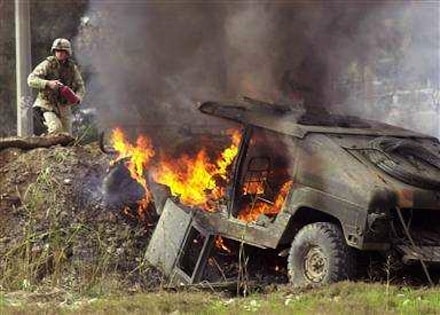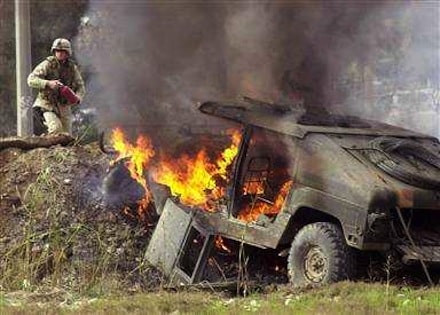
The United States invaded Iraq in March, 2003. Over the ensuing fourteen years we’ve done nothing of significance that hasn’t proven counterproductive.
None of this should have been a surprise. Prior to invading Iraq, Lieutenant General Bill Odom, the Director of the National Security Agency under President Reagan, made it clear in every forum that would carry his opinion that if America invaded Iraq it would be the greatest strategic blunder in the nation’s history. Those of us with any knowledge of the region shared his opinion. Unhappily, the nation’s elected leadership ignored the fact that the Sunni-Shia religious conflict over Mohammed’s succession has defined the entire region since it began in 632AD and blundered into a religious war we couldn’t win.
The dream of a Shia Crescent, with Shias controlling Iran, Iraq and Syria was, as long as Saddam Hussein ruled Iraq, impossible to realize. Our invasion of Iraq, and the elections which the majority Shias dominated, made the Shia Crescent a reality. Iraq’s leading Shia cleric, Grand Ayatollah Sistani, made it clear he would insist every vote counted and made sure his Shia majority got to the polls. While Al-Qaeda and ISIS, supported by their Sunni brethren in Saudi Arabia and the other Gulf States, along with the Kurds are contesting this reality, our absence of any Grand Strategy in the region and hostility to the Shias has given the Russians a strategic opening which can’t be reversed.
While the invasion of Iraq was our most significant blunder, the region’s revolutions, most of which we are alleged to have had a hand in fomenting, have also proven either disastrous or, at best, unproductive. In destabilizing an entire region, we have flooded Europe with refugees and destroyed Christian and other communities in the Middle East which, until George Bush’s Presidency, had existed for 2,000 years.
Today, the Russian presence in the Shia Crescent can only expand. The Iraqis have invited limited numbers of US troops to help them defeat Sunni elements, principally ISIS, which challenge the government. Once ISIS in Iraq is largely defeated, I would expect our forces to be again told to leave. Our presence in Syria appears to be winding down as the Syrian government forces, with Russian assistance, appear to be heading for victory and an end to the civil war.
At the same time, the Russians have sold the Iranians their S-300 anti-aircraft system and deployed their more advanced S-400 anti-aircraft system in Syria. Should Iraq at some point offer the Russians the use of one of the Air Force bases we built, Russian forces would probably also enjoy the protection of S-400s.
Finally, the Russians are reported to be in talks with the Turks, an important NATO ally, to sell them their S-400 system. The Russians have already sold S-400s to India, but their sale to Turkey would be seen as particularly significant. The end result would be both a weakened NATO and, even absent Turkey, a potential no-fly zone across the entire Shia Crescent. YouTube, incidentally, has a comparison of our Patriot anti-aircraft system and the Russian S-400 anti-aircraft system which explains why almost every foreign country is interested in buying the S-400 system or, failing that, the less advanced S-300 system.
During the fourteen years we’ve been stumbling through the Middle East, at enormous cost in American lives, wounded, prestige, leadership and money, the Russians and Chinese have been expanding their military capabilities. During the Cold War, the Soviet Union chose not to match the US in naval power, for example, but did seek advanced missile and electronic warfare capabilities. Russia has continued to devote significant resources in these areas.
Rather than wasting money in the Middle East, America should have spent its funds on defending the country. Three years ago, the USS Donald Cook, one of our most modern destroyers was sailing in the Black Sea when a Russian aircraft equipped with an electrical pod buzzed the ship three times. On the last pass, the Cook lost its electrical power which after a few minutes – enough to be fatal against hypersonic missiles – it was able to restore. The Chinese have just conducted sea trials of their first aircraft carrier, continue to devote substantial resources to anti-ship and other missiles and just finished building the largest submarine construction facility in the world.
Finally, our blundering in the Middle East has led to a real loss of American prestige and many countries that may have deferred to the US in the past, have signed on to the Chinese One Belt, One Road Initiative and joined the Shanghai Cooperation Association. The One Belt, One Road Initiative seeks to extend Chinese influence across Asia, including the Shia Crescent, and into Europe. The Shanghai Cooperation Association covers Central Asia and includes, among others, Russia, India and Pakistan. Supported by financing provided by the Asian Infrastructure Investment Bank, these Chinese initiatives are being well received. To support these initiatives, the Chinese are building a port in the Horn of Africa. This port will be in the Gulf of Aden and will overlook the Bab al-Mandeb Strait at the foot of the Red Sea. The Northern end of the Red Sea is the Suez Canal. They are reported to be putting an additional port facility in Southern Iran on the Gulf of Oman, East of the Strait of Hormuz.
It is difficult to escape the conclusion that we have no idea what we’re doing in the Middle East. The winners in our Middle Eastern disaster are the Russians, Chinese, Shias, various arms makers and contractors and an element in Israeli politics which believes, mistakenly in my view, the more turmoil in the Arab world the better. Everyone else has taken a beating, the US most of all.
While our Navy should continue to sail everywhere, the rest of our forces should be brought home from the Middle East. Our budget priorities should favor the Navy and Air Force while the Army, the most elastic of our forces, should be reduced in size. Our obligations to our allies can be satisfied with air and naval power while at the same time forcing them to rely on their own ground forces consistent with the threats they perceive. Rumors that the Saudis, in exchange for a US commitment to engage Iran militarily, would recognize Israel should be seen as desperation on the Saudi’s part and another fool’s errand from America’s standpoint.
Let the Sunnis and Shias go back to their religious war without our interference. That would at least offer the possibility that we might not be seen as a party to their conflict. Absent oil, which they have to sell to the world market to raise the funds they need to buy food, there’s simply nothing in the Middle East worth an American sprained ankle.
McConnell is a New Hampshire State Representative, a retired US Army Colonel, and a graduate of the US Army War College

